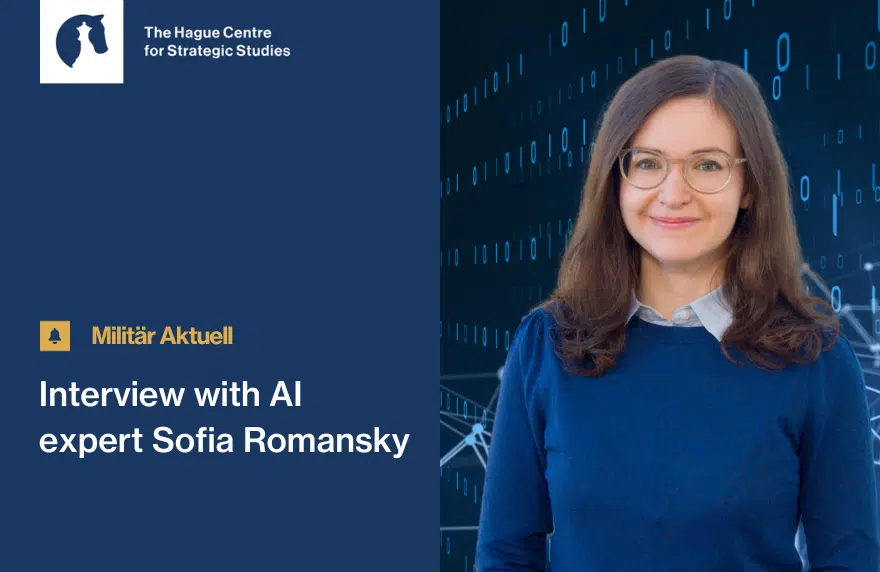Militär Aktuell recently took part in the Paris Action Summit on Artificial Intelligence (February 10-11), a high-profile event organized by the French Ministry of Foreign Affairs. On the fringes of the summit, the renowned École Supérieure de Guerre provided an opportunity to talk to Sofia Romansky, strategic analyst at The Hague Centre for Strategic Studies and project coordinator of the Global Commission on Responsible AI in the Military Domain.
(See below for a German version of this interview)
Sofia Romansky conducted a comprehensive investigation into the military use of information during the first seven months of the Russian invasion of Ukraine in 2022. She also wrote a study on the protection of European AI innovations to prevent their use in China’s military development.
Ms Romansky, at the Action Summit there was often talk of AI tools that can replace human actors in certain applications. How exactly is that to be understood?
Currently, most of the AI models we work with or talk about are geared towards a specific task or a clearly defined area of application.
So tasks such as target tracking, identification or decision support?
Exactly. AI tools are providing increasingly precise and relevant recommendations – that is their purpose.
But now it is being said that supervision, i.e. management, could also be taken over by AI tools?
Yes, because these systems can perform several tasks simultaneously and benefit from specialized, singularly operating AI systems. We then speak of so-called agents.
So you coordinate what happens on several levels?
Yes, they make decisions about how the subordinate systems are managed. The result is a kind of pyramid-shaped structure.
But without humans at the helm? Isn’t their knowledge based on machine learning and what human operators tell them?
It’s a combination. You can involve people who check the results of the agents, or you can let them act autonomously – under the supervision of higher AI instances. Both are possible. This development is now coming to the fore.
And your role is to regulate this or at least give governments guidance on what they need to look out for?
We set standards and principles to define the framework for responsible AI – not in the form of hard regulations, but as guidelines. The question is: What is responsible AI? It must reliably fulfill certain tasks. Only when the associated standards are met can states and users use it safely.
And whoever does not adhere to these parameters is operating in a gray area?
Exactly. For example, there is a view that certain AI systems are inherently illegal due to their unpredictability. However, a certain degree of predictability is required in the military sector in particular. If a system is too unpredictable, its use could violate international humanitarian law. This is one of the central questions we are dealing with.
Source: Militär Aktuell, 18 february 2025
KI Expertin Sofia Romansky im Interview
Militär Aktuell nahm kürzlich am Pariser Aktionsgipfel zur Künstlichen Intelligenz (10. – 11. Februar) teil, einer hochkarätigen Veranstaltung des französischen Außenministeriums. Am Rande des Gipfels bot sich an der renommierten École Supérieure de Guerre die Gelegenheit zum Gespräch mit Sofia Romansky, strategische Analystin am The Hague Centre for Strategic Studies und Projektkoordinatorin der Global Commission on Responsible AI in the Military Domain (GC REAIM).
Sofia Romansky führte 2022 eine umfassende Untersuchung zur militärischen Nutzung von Informationen während der ersten sieben Monate der russischen Invasion in der Ukraine durch. Zudem verfasste sie eine Studie zum Schutz europäischer KI-Innovationen, um deren Nutzung in Chinas militärischer Entwicklung zu verhindern.
Frau Romansky, auf dem Aktionsgipfel war oft von KI-Tools die Rede, die in bestimmten Anwendungen menschliche Akteure ersetzen können. Wie genau ist das zu verstehen?
Derzeit sind die meisten KI-Modelle, mit denen wir arbeiten oder über die wir sprechen, auf eine spezifische Aufgabe oder einen klar definierten Anwendungsbereich ausgerichtet.
Also Aufgaben wie Zielverfolgung, Identifikation oder Entscheidungsunterstützung?
Genau. Dabei geben die KI-Tools zunehmend präzisere und relevantere Empfehlungen – das ist ihr Zweck.
Aber nun heißt es, dass auch die Supervision, also die Führung, von KI-Tools übernommen werden könnte?
Ja, weil diese Systeme mehrere Aufgaben gleichzeitig ausführen können und dabei von spezialisierten, singulär arbeitenden KI-Systemen profitieren. Wir sprechen dann von sogenannten Agenten.
Sie koordinieren also, was auf mehreren Ebenen abläuft?
Ja, sie treffen Entscheidungen darüber, wie die untergeordneten Systeme verwaltet werden. Es entsteht eine Art pyramidenförmige Struktur.
Aber ohne Menschen in der Führung? Basiert ihr Wissen denn nicht auf maschinellem Lernen und dem, was ihnen menschliche Betreiber vorgeben?
Es ist eine Kombination. Man kann Menschen einbinden, die die Ergebnisse der Agenten überprüfen, oder man lässt sie autonom agieren – unter der Aufsicht höherer KI-Instanzen. Beides ist möglich. Diese Entwicklung rückt jetzt stärker ins Licht.
Und Ihre Rolle ist es, das zu regulieren oder zumindest Regierungen Orientierung zu geben, worauf sie achten müssen?
Wir setzen Normen und Prinzipien, um den Rahmen für verantwortungsvolle KI zu definieren – nicht in Form harter Vorschriften, sondern als Leitlinien. Die Frage ist: Was ist verantwortungsvolle KI? Sie muss verlässlich bestimmte Aufgaben erfüllen. Erst wenn damit verbundene Standards erfüllt sind, können Staaten und Anwender sie sicher einsetzen.
Und wer sich nicht an diese Parameter hält, bewegt sich in einer Grauzone?
Genau. Es gibt zum Beispiel die Auffassung, dass bestimmte KI-Systeme aufgrund ihrer Unvorhersehbarkeit von Natur aus rechtswidrig sind. Gerade im militärischen Bereich braucht es aber ein gewisses Maß an Vorhersehbarkeit. Wenn ein System zu unberechenbar ist, könnte seine Nutzung gegen humanitäres Völkerrecht verstoßen. Das ist eine der zentralen Fragen, mit denen wir uns beschäftigen.





